|
|
|
Sort Order |
|
|
|
Items / Page
|
|
|
|
|
|
|
| Srl | Item |
| 1 |
ID:
082931


|
|
|
|
|
| Publication |
2008.
|
| Summary/Abstract |
This paper critically examines the different ways that analysts and policy-makers have assessed the future shape of the Cuban regime following the future passing of its long-time revolutionary leader, Fidel Castro. Certainly, from a social science perspective, the future of Cuba after Fidel Castro is open. On the other hand, different, often mutually inconsistent scenarios for regime transition suggest that Cuba's future is over-determined. Both features of social reality - openness and over-determination - create space for visions, ideologies, strategies, and other normative interventions designed to impose a particular cognitive and political order on social reality. While social science should try to include such 'subjective factors' in its objective account, it must maintain a critical distance from the normative closure and hopeful predictions that ideologies and strategies of necessity imply. Based on an analytical distinction between relatively stable systems and rapidly changing systems, this paper identifies and goes on to discuss the major systems of primary relevance for Cuba's future.
|
|
|
|
|
|
|
|
|
|
|
|
|
|
|
|
| 2 |
ID:
110831
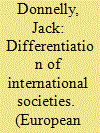

|
|
|
|
|
| Publication |
2012.
|
| Summary/Abstract |
Taking off from a recent article in this journal by Barry Buzan and Mathias Albert, I present a framework of structural differentiation as an alternative to IR's standard tripartite conception of the elements of structure. Rather than employ ideal type models, though, as Buzan and Albert do, I present a more open-textured, multidimensional account of differentiation. I also emphasize the systemic nature of structural analysis. The elements of structure are interdependent parts of wholes (systems) - not the independent variables implied by standard formulations such as 'the effects of anarchy'. A multidimensional systemic approach directs our attention to the diversity of and change in international systems and their structures, which mainstream structural IR typically ignores or obscures. I illustrate both the regularity of extensive structural change and the analytical utility of my differentiation framework with case studies of post-World War II international society and contemporary processes of globalization.
|
|
|
|
|
|
|
|
|
|
|
|
|
|
|
|
| 3 |
ID:
156990
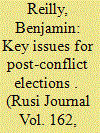

|
|
|
|
|
| Summary/Abstract |
Elections are central to many contemporary post-conflict accords, but poorly timed elections may have negative consequences for the consolidation of both peace and democracy. Benjamin Reilly examines key issues of: electoral timing, including how soon to hold elections following hostilities; whether to sequence national and local polls; and which models of electoral system and administration are most appropriate in post-conflict environments.
|
|
|
|
|
|
|
|
|
|
|
|
|
|
|
|
| 4 |
ID:
187535
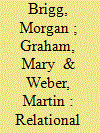

|
|
|
|
|
| Summary/Abstract |
Ontological parochialism persists in International Relations (IR) scholarship among gestures towards relational ontological reinvention. Meanwhile, the inter-polity relations of many Indigenous peoples pre-date contemporary IR and tend to be substantively relational. This situation invites rethinking of IR's understandings of political order and inter-polity relations. We take up this task by laying out necessary methodological innovations to engage with Aboriginal Australia and then showing how conventional and much recent heterodox IR seek to create forms of ‘escape’ from lived political relations by asserting the powerful yet problematic social science mechanism of observer's distance. This demonstrates a need to take Aboriginal Australia as a system on its own terms to speak back to IR. We next explain how Aboriginal Australian people produce political order on the Australian continent through a ‘relational-ecological’ disposition that contrasts with IR's predominant ‘survivalist’ disposition. The accompanying capacity to manage survivalism through relationalism provides an avenue for engaging with and recasting some of mainstream IR's survivalist assumptions, including by considering an Aboriginal approach to multipolarity, without attempting ‘pure escape’ through alternative ontologies. We thus argue that while it is necessary to critique and recast dominant IR, doing so requires putting dominant IR and Indigenous understandings into relational exchange.
|
|
|
|
|
|
|
|
|
|
|
|
|
|
|
|
| 5 |
ID:
165356
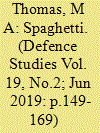

|
|
|
|
|
| Summary/Abstract |
In the mid-2000s, the United States Army was embroiled in counterinsurgency missions in Iraq and Afghanistan that required deeper understanding of local social systems. The Army turned to systems thinking and design thinking to model and understand the world, define problems, and develop approaches to strategic and operational challenges. However, the Army’s approach as expressed in publications and doctrine encourages the development of complicated, unsupported, and unfalsifiable hypotheses. The risk is that the Army will act on incorrect assumptions and develop plans that are fragile.
|
|
|
|
|
|
|
|
|
|
|
|
|
|
|
|
| 6 |
ID:
090147
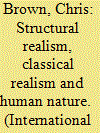

|
|
|
|
|
| Publication |
2009.
|
| Summary/Abstract |
Kenneth Waltz's Theory of International Politics is a modern classic, and deserves to be read the way classic texts ought to be read, i.e. in context and in its own terms. Recovering the context in this case is difficult because of the changes in the discourse since 1979, but one difference between the contemporary and the current reception of the text does seem clear - Waltzian structural realism (or neorealism) is now, but was not then, seen as breaking with the traditions of classical realism. How is this discontinuity to be understood? Part of the answer lies in the rhetoric employed by participants in this debate, but, more substantively, there is a genuine disagreement between neorealism and classical realism over the role played by human nature in international relations. Waltzian neorealism appears, contrary to the tradition, to reject any major role for human nature, describing theories that emphasise this notion as `reductionist'; however, on closer examination, the picture is less clear-cut. Waltz's account of human nature can be related quite closely to the major strands in the realist genealogy, but at a tangent to them. Interestingly, and perhaps unexpectedly, it is also compatible with at least some of the findings of contemporary evolutionary psychology.
|
|
|
|
|
|
|
|
|
|
|
|
|
|
|
|
|
|
|
|
|